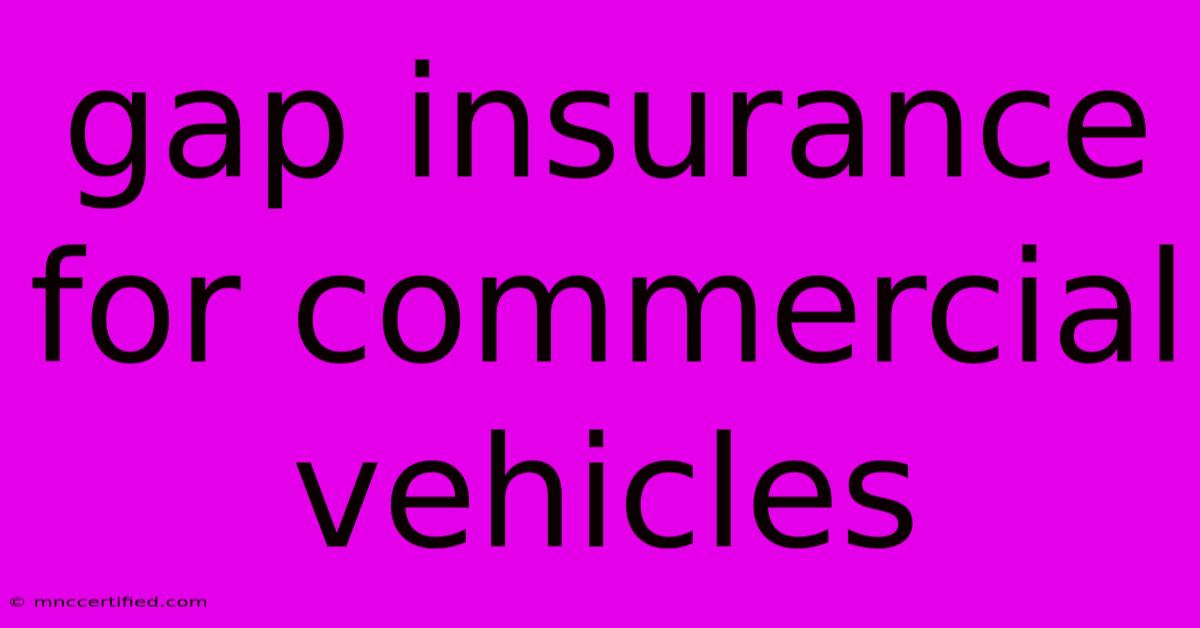Gap Insurance For Commercial Vehicles

Table of Contents
Gap Insurance for Commercial Vehicles: Protecting Your Business from Financial Loss
Owning a commercial vehicle is a significant investment, and protecting it from financial risks is crucial for any business owner. While comprehensive insurance covers physical damage to your vehicle, it may not fully compensate you in case of a total loss. This is where gap insurance comes in, bridging the gap between the actual value of your vehicle and the amount your insurance pays out.
What is Gap Insurance for Commercial Vehicles?
Gap insurance is a specialized coverage designed to protect business owners from financial loss in the event of a total loss or theft of their commercial vehicle. It covers the difference between the outstanding loan balance on your vehicle and its actual cash value (ACV) at the time of the loss. This can be a substantial amount, especially for newer vehicles that depreciate quickly.
Why Should You Consider Gap Insurance?
Here are some compelling reasons why gap insurance is a valuable investment for commercial vehicle owners:
- Protects Your Business from Financial Strain: Without gap insurance, you might be left with a significant debt after a total loss, putting your business in a financially vulnerable position.
- Covers Depreciation: Commercial vehicles depreciate rapidly, meaning their market value drops significantly over time. Gap insurance covers this depreciation, ensuring you receive the full amount needed to replace the vehicle.
- Offers Peace of Mind: Knowing you're protected from potential financial loss due to a vehicle accident or theft can give you peace of mind and allow you to focus on your business.
Who Needs Gap Insurance?
Gap insurance is particularly beneficial for:
- Businesses with Newer Vehicles: Newer vehicles depreciate more rapidly, making gap insurance crucial to cover the financial gap.
- Vehicles with Longer Loan Terms: The longer your loan term, the greater the potential for depreciation and the larger the potential financial loss if you are unable to repay the loan.
- Businesses that Rely Heavily on Their Commercial Vehicles: If your business relies heavily on your vehicle for operations, gap insurance can help ensure business continuity in the event of a loss.
How Does Gap Insurance Work?
Here's how gap insurance works in practice:
- Purchase Gap Insurance: You can purchase gap insurance from your insurance provider or through a third-party vendor.
- Total Loss or Theft: If your commercial vehicle is totaled or stolen, your insurance will pay the ACV.
- Gap Insurance Kicks In: Gap insurance will cover the difference between the ACV and the outstanding loan balance, protecting you from any remaining debt.
Finding the Right Gap Insurance for Your Needs
When shopping for gap insurance, consider these factors:
- Coverage Amount: Ensure the coverage amount is sufficient to cover the potential financial gap.
- Premiums: Compare premiums from different insurers to find the most cost-effective option.
- Exclusions: Understand any limitations or exclusions within the policy.
Conclusion
Gap insurance is a valuable tool for commercial vehicle owners seeking to protect their businesses from financial loss. By bridging the gap between the ACV and the loan balance, gap insurance can help you recover from a total loss and keep your business running smoothly.
Remember to carefully research different providers and compare their coverage options, premiums, and exclusions to find the best gap insurance policy for your specific needs.

Thank you for visiting our website wich cover about Gap Insurance For Commercial Vehicles. We hope the information provided has been useful to you. Feel free to contact us if you have any questions or need further assistance. See you next time and dont miss to bookmark.
Featured Posts
-
Strictlys Most Talked About Routine Pete Wicks
Nov 10, 2024
-
Insurance For Therapy Dogs In Schools
Nov 10, 2024
-
Wolves 2 0 Southampton O Neils First Win Of The Season
Nov 10, 2024
-
Insurance Giant Crossword Puzzle Clue
Nov 10, 2024
-
Aston Villa Delivers Convincing Win Against Rivals
Nov 10, 2024